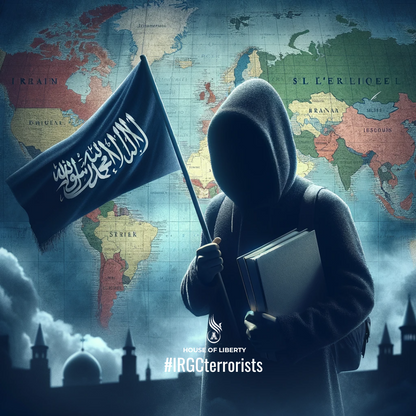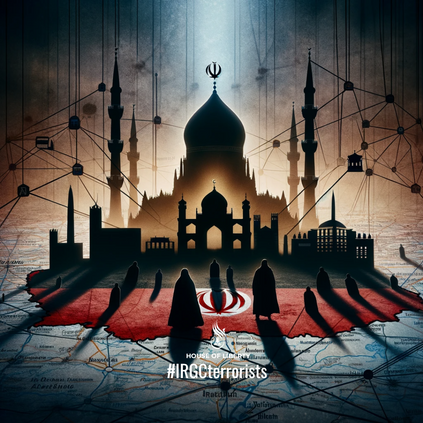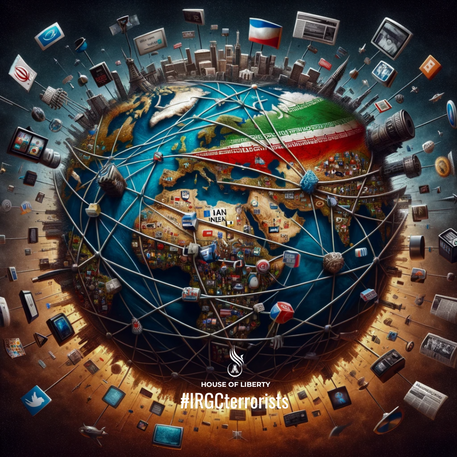26 Janvier 2024

The Islamic Republic of Iran utilizes its students abroad, specifically those on government scholarships, to bolster its Islamist influence. These students are mobilized to promote Shiite Islamism in Western democracies and are recruited to transfer information and expertise to the Ummah.
In 2020, Iranian Supreme Leader Ali Khamenei appointed Ahmad Vaezi to oversee Islamic student organizations in Europe. Serving as Khamenei's trustee, Vaezi acts as the direct link between Khamenei's office and Islamic student associations in Europe. A fervent supporter of the Islamic Republic's regime, he urged members of these associations in a letter to "emulate your model, the great leader of Islam, martyr Qasem Soleimani," referring to the Revolutionary Guards commander killed by the United States in 2020. Soleimani, known for his role in violent proxies across the Middle East, has become a significant symbolic figure for the Iranian regime, which exploits his image to extend its influence not only in the Middle East but also among young students in Europe.
Prior to the 1979 revolution, Islamic student associations in the West primarily consisted of Iranian students opposing the Pahlavi monarchy, many benefiting from generous government scholarships. Following the revolution, these associations, needing financial support from the government and seeking to gain power and status in the new regime, fully aligned with the Islamic Republic's ideology and eliminated opposition forces. For nearly four decades, these associations have commenced their annual gatherings by broadcasting messages from Khamenei.
While millions of Iranian university students pursue their studies through loans, work, and their parents' hard-earned savings, it's important to note the substantial expenses these students and their families incur to finance their studies abroad.
Due to these financial pressures, some students are likely to undertake various roles in service to the regime. This can include disseminating political propaganda, participating in anti-Israel rallies, and trying to recruit professors and peers to gather sensitive information aimed at enhancing the military and technical capabilities of the Iranian program.
It's also noteworthy that members of the "Islamic Students Association" in Britain have had several meetings with commanders and members of the Islamic Revolutionary Guard Corps (IRGC) since 2020. At these meetings, the commanders' speeches often centered on anti-Semitism and anti-Western sentiments. Additionally, in 2023, they organized a conference in Tehran, which was attended by guests including UK-based professors and individuals involved in Iranian technology companies, predominantly associated with the IRGC.
Periodically, members of these associations are invited to Iran, with their expenses covered by the government, to meet Khamenei. The most recent meeting of this kind occurred on January 2, 2023, during the height of student crackdowns amid the Women, Life, and Liberty movement protests. Despite severe repression of students in Iran, these associations steadfastly remain aligned with Tehran's regime.
Until the early 1990s, members of these associations were predominantly Shiite clerics sent to Europe by government propaganda organizations. Their mission involved organizing religious events such as Muharram mourning commemorations and Ramadan.

29 Janvier 2024
The newspaper "Berliner Zeitung" raised the possibility that Adnan Tabatabai, a German partner of the Foreign Ministry, acted as a double agent for the Iranian authorities in Germany. It is also suspected that the German Foreign Ministry may have supported a think tank aligned with the Iranian government. According to the German newspaper "Bild", Tabatabai's interactions with the Federal Foreign Minister suggest explicit support for Iran's authoritarian regime.
"Bild" also highlights suspicions about Adnan Tabatabai's active engagement in favor of the Iranian regime, particularly in promoting public relations for its nuclear program. Leaked emails have revealed how the Iranian regime has used various initiatives to influence the foreign policies of Western nations, with some experts even securing government positions in the United States. Adnan Tabatabai has consistently defended the mullahs and whitewashed the Islamist regime in the German media in recent years.
The Case of the Hamburg Mosque
In November 2023, the German federal police raided the Islamic Center Hamburg (IZH) on suspicion of supporting the Lebanese terrorist group Hezbollah. The Interior Ministry stated that the IZH's activities, controlled by Khamenei, aimed "to spread the revolutionary concept of the Iranian leaders" and posed a threat to the German constitutional order. Nancy Faeser, Germany's Interior Minister from the Social Democratic Party, stated: "At a time when many Jews feel particularly threatened, we do not tolerate Islamist propaganda or anti-Semitic and anti-Israeli incitement."
The IZH has been a hub of pro-Hezbollah activism and support for Qassem Soleimani, the former commander of the IRGC's Quds Force. In January 2020, following Soleimani's killing by a US drone strike in Iraq, about 600 pro-Iranian Islamists attended a memorial service at the Hamburg Center, praising him as a "heroic martyr."
The German Interior Ministry banned all Hezbollah activities in Germany in 2020. In addition to the raid on the IZH in Hamburg, German authorities inspected 54 properties in six other federal states: Baden-Württemberg, Bavaria, Berlin, Hesse, North Rhine-Westphalia, and Lower Saxony. German-Iranians and dissidents expressed support for the IZH's repression.
In early 2023, the German Federal Administrative Court labeled the IZH as an “extremist Islamic organization.” Dr. Kazem Moussavi, spokesperson for the Green Party of Iran in exile, commented: "The IZH is not a place of prayer for secular and democratic Muslims but a refuge for supporters of the jihadist regime, intelligence service personnel, and sympathizers of Hamas and Hezbollah."
Sheina Vojoudi of the Gold Institute for International Strategy told Iran International: "For years, Iranian dissidents have been trying to convince Germany to close the Islamic Republic-funded Islamic Center in Hamburg, which German courts consider an 'extremist Islamic organization." She added: "All Islamic centers funded by the Islamic Republic with Iranian funds must be closed. The Islamic Republic's aim is to spread anti-Semitism, surveil and threaten Iranians worldwide, and build its network to export its revolution." In October 2020, about 150 protesters urged the city of Hamburg to close the IZH. According to Vojoudi, "it is a proven fact that Hamas is funded and trained by the Islamic Republic, and the October 7 terrorist attack against Israel is a warning to the West, given that the Iranian regime has also established its Islamic centers in the heart of Europe."
Iranian dissidents have urged Martin Horn, the mayor of Freiburg in the southwestern state of Baden-Württemberg, to end its twinning partnership with the Iranian city of Esfahan. Horn has steadfastly refused to break the partnership. In another case, Stuttgart, the capital of Baden-Württemberg, continues to publish information about a pro-Hamas group on its municipal website.
30 Janvier 2024

In 2020, the US Department of Justice (DoJ) announced on Wednesday the seizure of 92 domain names used by Iran, four of which were operated by English-language news sites. These sites were identified using information provided by Google, with additional assistance from the social networks Twitter and Facebook, the DoJ added. Four of these sites, named "newsstand7.com", "usjournal.net", "usjournal.us", and "twtoday.net", were "operated by or on behalf of" the Revolutionary Guards, aiming to influence U.S. domestic and international policy, according to the department. The other 88 domain names included news sites aimed at "spreading Iranian propaganda" in Western Europe, the Middle East, and Southeast Asia.
Visitors accessing these sites on Wednesday encountered a message stating that "these domains have been seized by the Federal Bureau of Investigation (FBI)."
Foreign Television Channels and News Agencies as Propaganda Tools
The Islamic Republic of Iran, in addition to brutally repressing uprisings, also seeks to spread its ideology. Al Manar, the television channel of the Lebanese Hezbollah, which broadcast in French, and Sahar TV, with studios in Lebanon and Iran, have been banned from broadcasting in France. This decision by the CSA, confirmed in 2006 by the Council of State, did not end the propaganda of radical Shiites, however.
In Iran's media apparatus, the Irna press agency, known for its “French bashing” on its French website, particularly aims to show how Mali is leading the way for Africans to reject their former colonizer. Access to Irib’s French broadcasts, the national radio, is more challenging, as the website is inaccessible in France. However, its archives reveal the loss of its favorite French consultant, the Toulousian Pierre Dortiguier, on July 5, 2022. Dortiguier, who was involved with the neofascist movement Les Nationalistes and had converted to Shiism, also contributed to Égalité et Réconciliation.
The core of the “anti-imperialism” promoted by Iranian propaganda is anti-Semitism, thinly veiled under extreme anti-Zionism. For instance, the French-language site of the Press TV channel publishes articles about “Zionist attacks against Blacks” in the United States, attributed to the Jewish “lobby,” while Paris is depicted as a city besieged by Kurdish protests. These media target the French-speaking North African and African audience, accessible via satellite, with an editorial line portraying France as an enemy of the people, influenced by Israel and America. Fars News Agency, another official Tehran news agency, publishes content in French, such as on the Rue d'Enghien killings, presented as proof of French racism, with an article titled: "Iran calls on the French police to avoid violence against anti-racist demonstrators."
Tehran's propaganda is also disseminated by media linked to Lebanese Hezbollah. Al Manar, though banned from broadcasting in France, maintains an authorized French-language website, offering direct access to programs in Arabic. All of Ayatollah Khamenei's messages are available in video format. The channel emphasizes the struggle against the “Zionist entity,” but reveals a Tehran-Hezbollah-Russia axis, particularly in its coverage of the war in Ukraine. Al Manar also features its French-language political-religious magazine, Spiritual Lights, where Imam Khomeini's Koranic interpretations mix with reports of events like the “European Partisans Weekend” in Saint-Fons (Rhône). These meetings, although ostensibly spiritual, criticize democracies for rejecting diversity and imposing dominant norms, such as secularism.
Recently, in France the Alpes-Maritimes prefecture banned a screening and debate around a documentary film on Iranian General Qassem Soleimani in Nice. Organized by the Culture Populaire association, this event, described as "an ignoble conference in honor of General Soleimani, the former gray eminence of the Islamic regime of Iran," was labeled by the president of the Les Républicains party as "a real apology for Islamism and its massacres."
Sources: Iran International, Charlie Hebdo, I24 News, Bild, Berliner Zeitung, France Télévisions.
House of Liberty is a non-profit organization registered in Sweden & France.
Association Registration Number in Sweden : 802543 - 9533
House of Liberty | BOX 9031 Nora Torg 5 | 182 34 DANDERYD, SWEDEN
Association Registration Number in France : SIREN 924195845 - WRA : W751271403House of Liberty | 31 Avenue de Ségur | 75007 Paris 7, FRANCE
Copyright © 2023 - All rights reserved